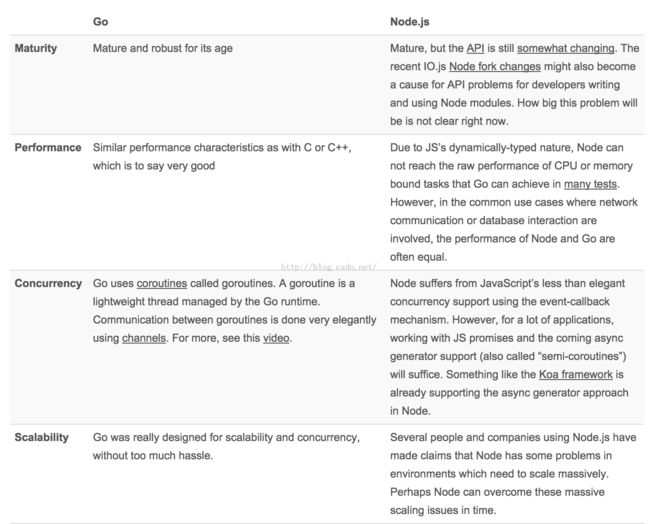Blog Node.js vs Golang: Battle of the Next-Gen Languages
Recently, there have been criticisms about the value of using Node.js in a high-performance, networked application environment, and some developers have moved to the Go language.
There are also several high-profile corporate examples switching to using Go, beyond the creator of the language, Google. Dropbox has moved to Go, claiming significant performance increases, and the developers of the Docker virtualization system are also using Go.
It’s important to note, however, that Node.js is still used by a much wider audience, has more modules, is easier to use, and isn’t going anywhere anytime soon. Also, if you’re making a web application, Node.js will probably be your language of choice, as Go is currently used more as a scripting language when focus on concurrency and speed is the priority.
In this article, we will take a look at the differences between Node.js and Go from the developer’s point of view to uncover the strengths and weaknesses of each environment.
Node.js and the Javascript Language
Node.js emblem
Node.js (and its recent fork, IO.js) is an increasingly-popular platform built on a fast, JavaScript-based runtime: V8.
V8 is a JS virtual machine created by Google that is designed to build scalable, networked applications. It compiles JavaScript code to native machine code, using some complex optimizations. V8 also does the memory allocation and garbage collection of JS objects.
Though these dynamic optimizations for a dynamically-typed language offer a lot of flexibility for developers, they do come with some performance costs at times.
As Node.js is written in JavaScript, it inherits most of the properties of that language. JavaScript is so popular these days that the ECMAScript standard development is done mainly in an evolutionary fashion, rather than a revolutionary fashion.
This has some important side effects for JavaScript and Node development:
- Some of the JavaScript language flaws are difficult to fix without breaking backward-compatibility, though the worst issues are being fixed.
- Useful, but radical, JS language features may not be implemented or only be “patched on” as an add-on syntax. This can lead to a messier language design compared to languages that integrate features cleanly into their design. A good example of this is concurrent computing with JS. JS best practices for concurrent computing went from a concurrency API (using event-based callbacks), to the devolopment of promises, to the coming support for async generators. These days callback hell is still a serious issue with many Node.js applications; however, this has led to less readable code, slower development, and perhaps even more bugs.
All this means that the JavaScript language evolves rather slowly (and some would say poorly too), even when good concepts from other languages are known to work better.
Node.js still has a huge community and tons of great applications being written for it, so we don’t want to scare you away with some of its pitfalls in small cases; it’s still a great platform to work with, according to the vast majority of developers.
The Go Language or Golang
Go, which is also referred to as “Golang,” is a compiled systems-oriented programming language started by Google in 2007. Go can be considered the result of a rather conservative language evolution from languages such as C and C++.
Go improves upon some of the misgivings of those languages:
- poor dependency management
- cumbersome type systems
- difficult memory management
- lack of parallel computation support
- lack of multi-core support
Go also reduces the amount of code typing needed by being more expressive than C or C++.
Go makes it much easier to write robust, networked applications, without sacrificing much in the way of performance, compared to C or C++. The high performance is in large part due to the static compilation of the statically-typed Go code. A lot of optimizations are possible when a compiler can do all the code inspection work beforehand, as opposed to the dynamic JS compiler work done during runtime.
Golang vs Node.js Comparison of Features
We can begin to see why, for some types of application development, it might be useful to use Go instead of Node.js; however, Node.js is still a very useful language in many use cases.
Let’s compare the strengths and weaknesses of each programming language, so it may be easier to choose which environment is the right tool for your next job.
Summary of Node.js vs Golang
The choice between Node.js or Go very much depends on which type of development suites you best and how massive the network service needs to scale.
Go may not yet have all community packages or mindshare that Node has, but its syntactically cleaner concurrency model, better raw CPU- and memory-bound performance, and its ability to scale up better with concurrent loads could make for a better foundation for certain network application types.
If you need certain Node.js packages that are not yet available for Go and that would be difficult or expensive to re-implement in Go, then Node may be the wiser choice.
If you feel like installing Go on your Ubuntu/Linux system, have a look at our guide to installing Go. Then visit GoByExample and the online Go book for some more great tutorials.
If you wanted to give Node.js a shot, be sure to check out our guide to installing Node.js, as well as our list of free Node.js hosting services. Then head on over to NodeSchool.io for some great tutorials on programming with Node.js.
转载地址:http://www.hostingadvice.com/blog/nodejs-vs-golang/

